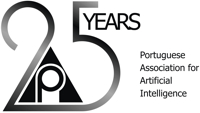GAI
General Artificial Intelligence
As in previous editions of the conference, EPIA 2009 will include a thematic track on General Artificial Intelligence which is focused on general methodologies and architectures for intelligent systems but will also accept submissions on subareas of artificial intelligence not covered by the other thematic tracks.
Of particular relevance to this track are papers on issues that arise in the design and construction of complex artificial intelligent agents, integrating such component technologies as planning, reasoning, language, dialogue, perception, goal-driven action, and learning. This includes, but is not limited to human-level intelligent agents. All available paths are welcome, including theoretical and experimental computer science, cognitive science, neuroscience, and innovative interdisciplinary methodologies.
Topics of Interest
Including but not limited to:
- Foundations and Theory
- The Role of Embodiment in GAI
- Management of Complex Goal Structures
- Lifelong and Multi-Strategy Learning
- Case-by-case Problem-Solving
- Language Processing based on GAI
- Connecting Sensorimotor and Concept-level Cognition
- Coherence of Integrative/Hybrid Systems
- Evaluation and Comparison of GAI Projects
- Cognitive architectures
- Intelligent user interfaces
- Multimodal communication
- Virtual characters
Organising Committee
- Luís Seabra Lopes, Universidade de Aveiro, Portugal
- Nuno Lau, Universidade de Aveiro, Portugal
- Pedro Mariano, Universidade de Aveiro, Portugal
- Luís Rocha, Indiana University, USA
Contact
lsl[at]ua[.]pt
Program Committee
- Amílcar Cardoso, UC, Portugal
- Anna Really Costa, USP, Brazil
- Arlindo Oliveira, IST, Portugal
- Bernd Neumann, UH, Germany
- Carlos Bento, UC, Portugal
- Carlos Ramos, IPP, Portugal
- Cipriano Galindo, UMa, Spain
- Ernesto Costa, UC, Portugal
- Eugenio Oliveira, UP, Portugal
- Fariba Sadri, IC, England
- Florentino Fdez-Riverola, UVigo, Spain
- Francisco Azevedo, UNL, Portugal
- Gabriel Pereira Lopes, UNL, Portugal
- Gaël Dias, UBI, Portugal
- Hélder Coelho, UL, Portugal
- Inês Dutra, UFRJ, Brazil
- Inês Lynce, IST, Portugal
- João Leite, UNL, Portugal
- Jonathan H. Connell, IBM, USA
- José Carlos Príncipe, USF, Portugal
- José Manuel Machado, UM, Portugal
- Juan Corchado, University of Salamanca, Spain
- Luís Camarinha-Matos, UNL, Portugal
- Luís Correia, UL, Portugal
- Luis Moniz Pereira, UNL, Portugal
- Manuel Delgado, University of Santiago de Compostela, Spain
- Manuel Filipe Santos, UM, Portugal
- Michael Anderson, U. Maryland, USA
- Michael Witbrock, Cycorp, USA
- Paulo Urbano, UL, Portugal
- Pedro Barahona, UNL, Portugal
- Pedro Rangel Henriques, UM, Portugal
- Ricardo Rabelo, UFSC, Brazil
- Rosa Vicari, UFRGS, Brazil
- Rui Mendes, UM, Portugal
- Salvador Abreu, UE, Portugal
- Zita Vale, ISEP/IPP, Portugal

